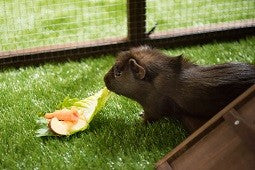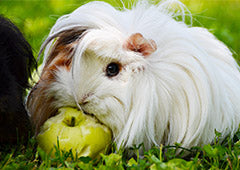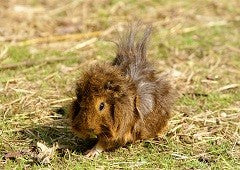If you’re looking for a new pet to welcome into your household that is small, doesn’t require much space, is quiet, relatively low-maintenance, and has adorableness in spades; then you should consider a guinea pig as your pet of choice.
When it comes to choosing your gorgeous little guinea there are a few things you should pay attention to, to ensure you are getting a happy and healthy little friend that will be around, giving you lots of love for many years to come.
Whether you are searching for a guinea pig from a professional breeder, pet store or animal rescue organisation, make sure to look at the following:
-
Check out their overall body condition- they should be neither skinny or fat, with no apparent lumps, scabs or swellings on their body, a sign that they may have been mistreated or not properly cared for.
-
Their coat should appear well groomed- full and smooth looking, with no bald patches. It is best to avoid guinea pigs with obvious bald or red patches of skin, as this generally means they are in poor health.
-
If possible, also check around their rear end area for soiling, as this can indicate an issue with diarrhea or internal gut issues.
-
Their eyes, nose and ears should all be clean and free from discharge, or in the eyes, crusting.
-
If you can, try and get a look at their teeth- they should be well aligned, and not overgrown.
-
When breathing, it should be quiet and hardly recognisable- no strange wheezing or gurgling noises should be apparent.
-
The guinea pig should appear lively, curious and bright in nature- not lethargic.
-
Observe how the guinea pig behaves around, and reacts to people. It is completely normal for them to appear a little skittish at first, but they should be relatively calm and comfortable with being approached, and in the company of others.
-
Watch their actions and how they more- there should be no apparent signs of lameness or soreness, as this can be an indication of poor health or injury.
- It is vital to take a look at the guinea pig’s living environment. They should be residing in hygienic surroundings- a clean cage, with easy access to plenty of fresh food and water, not overcrowded with plenty of room to roam and exercise. Guinea pigs that are kept under good conditions will generally be calmer, less stressed, and will have less exposure to some typical diseases.

Some other handy tips when it comes to selection…
-
If you can, try and find out the age of your guinea pig, and adopt one as young as possible. 6 weeks is the youngest a piglet should be when going off to new home, so around this is best.
-
Check out any other guinea pigs that are in the same cage or shelter. If them seem ill, off or lethargic, it is probably best to avoid buying from there, as it could be a health issue that is contagious.
-
As female guinea pigs can become pregnant as young as 4 weeks of age, if you are buying a female, make sure she has been separated from males to save you from the possibility of a surprise pregnancy.
-
When buying, be sure to ask plenty of questions, and ask to handle them. If you have small children, you don’t want a guinea that is uncomfortable and skittish around small hands.
Guinea pigs are charming and funny little creatures that make the ideal low-maintenance, no fuss pet. Just be sure to take note of the above points when it comes to selecting your new precious pet, so you can ensure they are happy, healthy and ready for a new home in their Piggy Parlour, Piggy Paradise or Piggy Pen!


















